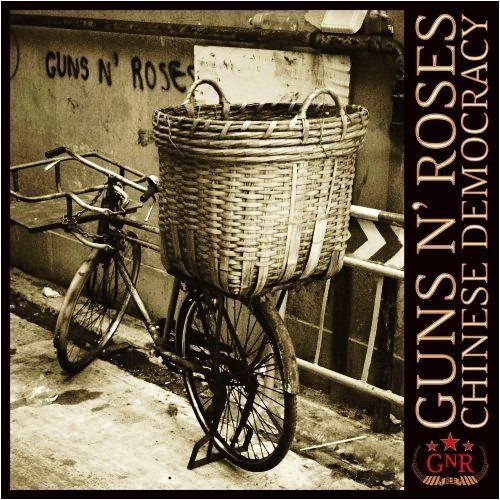Let’s get one thing straight: Dark Side of the Moon on crack probably wouldn’t justify the 14-year, $13 million wait for Guns N’ Roses’ legendarily delayed Chinese Democracy. To many, Axl Rose’s ludicrous soap opera of delays, failed tours, and endless lineup changes is just as interesting as the idea that an actual album would emerge from it. Rose is the only link between the band that recorded the 1987 hard-rock landmark Appetite for Destruction and the one currently calling itself Guns N’ Roses, which features members of Primus, Nine Inch Nails, and the Replacements, among others.
And if Chinese Democracy had been the train wreck most predicted and hoped it would be, that fact would be relevant. But somehow or other, Axl has managed to turn Guns N’ Roses 2.0 into a real band, one that has made not only the best GNR album since Appetite but the best hard rock album of the last several years. Chinese Democracy’s 14 tracks are heavy but infectiously melodic, dirty but grandiose—in short, everything the original Gunners were great at, updated for a post-NIN rock landscape and stuffed into a filler-free 71-minute rush of hot guitars, hip-hop beats, and orchestral bombast. Slash and Duff McKagan aren’t listed in the album’s voluminous credits, but the material on Chinese Democracy is strong enough that you don’t care.
At the time of the original band’s dissolution around 1994, Rose’s fascination with industrial and electronic music put him at odds with his bandmates, who saw themselves as their generation’s answer to Led Zeppelin. Since then, the other members have made their cases (Slash’s Snakepit, Velvet Revolver), with varying degrees of success. Meanwhile, Rose has spent the entire Clinton and Bush administrations reworking and tinkering with these songs, pouring every fiber of his being into proving that he did not break up the premiere hard rock band of the late 1980s for nothing. The weight of this task can be heard all throughout Chinese Democracy, from the razor-sharp riffing that opens it to the anguished plea (“please be kind/I’ve done all I should”) that closes it.
Chinese Democracy is pretty evenly divided between tricked-out rockers and “November Rain”-style epic ballads. Every track is stuffed to the brink with walls of guitars, layers of strings, and choruses of Axls. From the sound of it, every single idea that was kicked around during the 14-year recording sessions was used somewhere on the album. Rose’s storied perfectionism has ensured that not a hair is out of place in the songs’ almost comically intricate arrangements. Still, Buckethead’s stunning solo in “There Was a Time” and Robin Finck’s soulful turn in “Catcher in the Rye” manage to cut through the Steely Dan-slick production with the kind of brute force the original Guns were known for.
Rose’s inimitable devil-woman shriek is all over the album, in better form than even the most optimistic diehards could have dared hope. The pulverizing bridge of standout cut “Better” and the vocal acrobatics of the ending of “Street of Dreams” find Rose able to elicit the same chills as he did on “My Michelle” and “Rocket Queen” two decades ago.
Many of these songs have been floating around for years (“Madagascar” and the title track have been live staples since 2001, while “I.R.S.,” “Better,” and “There Was a Time” leaked in demo form in early 2006), but finally hearing them in order makes them feel fresh. The most overstuffed of the ballads, “Catcher in the Rye,” gives way to “Scraped” and “Riad N’ The Bedouins,” two searing rockers that would sit comfortably on Appetite. “Street of Dreams” is Rose’s update of “Estranged,” while the utterly bizarre funk-metal-flamenco hybrid “If the World” comes further out of left field than anything on the sprawling, wildly eclectic Use Your Illusion albums. Rose is at his most self-indulgent on the melodramatic “This I Love,” where he croons over layers of piano, strings, and harp before a gorgeous, lyrical Finck solo ushers the song safely back into “Don’t Cry” territory. The album’s epic closer, “Prostitute,” takes the entire thing to its logical conclusion, piling on drum loops, interlocking riffs, orchestral fireworks, and synth effects with absolutely zero restraint as Rose asks himself “what I would do to prostitute myself/to live with fortune and shame.”
It is obvious from listening to Chinese Democracy that nobody involved approached it as the Axl Rose solo album detractors have long said it would be. Underneath all the studio trickery, this is the work of a band, and a damn good one. The five guitarists credited (Finck, Buckethead, Ron Thal, Richard Fortus, and Paul Tobias) trade licks and solos the way Slash and Izzy Stradlin used to, except now there are five of them. Bassist Tommy Stinson and keyboardists Chris Pitman and Dizzy Reed (the only holdover from the Use Your Illusion-era lineup) play on nearly every track, and Rose shares most of the writing credits with other members. The genius of Appetite was that it injected bluesy swagger and punk attitude back into hard rock at a time when the genre was dominated by hair-spray hacks like Poison and Winger; similarly, Chinese Democracy injects classic-GNR swagger back into a somewhat tired metal landscape, with a new cast of players but with Rose’s singular howl intact.
Ultimately, Chinese Democracy is the only record Axl Rose could have made. He was never content to stay in one place, but he is a rocker at heart, and the ambition and scope of this music puts the warmed-over cock rock of Slash and McKagan’s Velvet Revolver to shame. His hermetic behavior, years of delays and false promises, and erratic live performances have made him rock’s most worn-out punchline, but on Chinese Democracy, Axl gets the last laugh.

